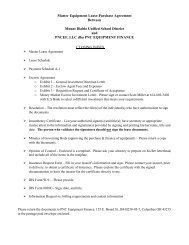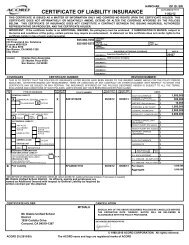Study of the Mount Diablo Unified School District - Mt. Diablo Unified ...
Study of the Mount Diablo Unified School District - Mt. Diablo Unified ...
Study of the Mount Diablo Unified School District - Mt. Diablo Unified ...
- No tags were found...
Create successful ePaper yourself
Turn your PDF publications into a flip-book with our unique Google optimized e-Paper software.
Policies, Procedures, and Compliance• Add Exhibit 5145.6 to <strong>the</strong> Special Education and Staff Handbooks to ensureunderstanding <strong>of</strong> requirements.Cost Implications for Issue 4‐3:This consideration can be implemented with existing staff with limited cost <strong>of</strong> a few pagesadded to <strong>the</strong> handbooks. Increased and sustained openness with staff and parents andcontinual notification <strong>of</strong> district processes for placement will likely reduce litigation costsand instill a sense <strong>of</strong> trust in <strong>the</strong> district’s willingness to serve students.Issue 4‐4: Pre‐Referral, Early Intervention, and Response to Intervention (RTI).MDUSD <strong>of</strong>fers support and training for a number <strong>of</strong> school‐based teams and pre‐referralprograms. Some schools have also adopted <strong>the</strong> Reponse to Intervention (RTI) model andare preparing staff for RTI. The Coordinated Care Team (CCT) and Student Success Team(SST) are examples <strong>of</strong> processes that seem to overlap and could cause confusion amongbuilding administrators, especially newly hired staff. The CCT addresses general issues thatare found in <strong>the</strong> classrooms, such as behavioral concerns, and <strong>the</strong> SST addresses issuesregarding potential placements through special education or Section 504. While somebuilding teams seem comfortable with <strong>the</strong> two processes, it appears confusing that issuesare not seen as common across both systems. There are questions as to <strong>the</strong> need andefficacy <strong>of</strong> having two processes operating within an already stretched staff with limitedresources. If <strong>the</strong> two processes were combined, <strong>the</strong>re would be less confusion regardingrequirements and fewer district resources used. RTI seems less popular and less prevalentin <strong>the</strong> schools as a means to provide general education support for students with learningdifficulties. There are some schools, however, that have embraced a RTI approach and MGTreceived documentation that indicates <strong>the</strong> approach is working well in those schools.During school visits, classroom observations, and interviews with school and districtadministration and teachers, MGT found that some schools are effectively utilizing <strong>the</strong>Academic Success Center model for effectively alleviating academic deficits <strong>of</strong> students withand without disabilities. Some interviewees attribute this intervention program to reducing<strong>the</strong> number <strong>of</strong> students with disabilities in <strong>the</strong> district. MGT found this model to be veryeffective in some schools and recognize it as a best practice. The effectiveness <strong>of</strong> thismodel, however, is not consistent throughout <strong>the</strong> district. The quality <strong>of</strong> early interveningservices and school‐based team processes vary from school to school.During onsite focus group discussions, interviews, and classroom visits, staff expressedfrustration as <strong>the</strong>y try to increase academic standards within <strong>the</strong> classroom and balance <strong>the</strong>needs <strong>of</strong> those not ready for <strong>the</strong> grade level work or <strong>the</strong> social politics <strong>of</strong> <strong>the</strong> school orclassroom. Many teachers report <strong>the</strong>y are not adequately prepared to manage remediation<strong>of</strong> language arts and ma<strong>the</strong>matics deficiencies, and behavioral concerns usually result in avisit to <strong>the</strong> <strong>of</strong>fice, suspension, or expulsion from school. Research has documented that with<strong>the</strong> proper skills teachers can <strong>of</strong>tentimes keep a student from being labeled as having aMGT <strong>of</strong> America, Inc. Page 4‐7















